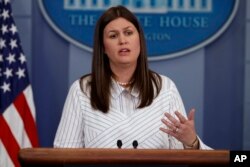First-time candidate Donald Trump got a late start on fundraising in 2016, holding his first big-ticket donor event only five months before Election Day. That won't be the case next time.
Some 40 months ahead of his next election, the president holds court at a $35,000-per-plate donor event Wednesday night at his hotel in Washington. About 300 people are expected to attend an event that will pull in about $10 million, said Lindsay Jancek, a spokeswoman for the Republican National Committee.
Breaking the tradition of his predecessor, Trump isn't allowing reporters to hear his remarks to the group of donors — despite an announcement earlier in the day that a pool of reporters would be allowed in to hear the president's remarks.
"It's a political event and they've chosen to keep that separate,'' White House deputy press secretary Sarah Huckabee Sanders said when asked why the event is closed to the media.
After reporters complained, Sanders announced that the president's remarks would be opened to the press — only to reverse herself hours later.
"Unfortunately there was some confusion with the RNC, and due to the logistical challenges bringing in the press at this late moment is not going to be possible,'' she said in an email.
Sanders also said there was nothing unusual about raising political cash so early.
"He's raising money for the party,'' she said. "I don't think that's abnormal for any president.''
Sanders' statement that Trump is raising cash for the GOP tells only part of the story, though.
The first cut of the money raised goes to Trump's 2020 re-election campaign. The rest gets spread among the RNC and other various Republican entities. Having multiple beneficiaries is what allows Trump to ask for well above the usual $5,400 per-donor maximum for each election cycle.
Those contribution limits are likely to change because this fundraiser is so early that new donation limits for 2020 have not been set by the Federal Election Commission.
Trump's historically early campaigning comes with benefits and challenges.
In the first three months of this year, the Trump campaign raised more than $7 million, through small donations and the sale of Trump-themed merchandise such as the ubiquitous, red "Make America Great Again'' ball caps.
The RNC also is benefiting from the new president's active campaigning, having raised about $62 million through the end of last month. The party has raised more online this year than it did in all of 2016 — a testament to Trump's success in reaching small donors.
Trump's re-election money helps pay for his political rallies. He's held five so far, and campaign director Michael Glassner says those events help keep him connected to his base of voters.
The constant politicking, however, means it is challenging for government employees to avoid inappropriately crossing ethical lines. Some watchdog groups have flagged White House employee tweets that veer into campaign territory. White House spokeswoman Lindsay Walters says the employees work closely with lawyers to avoid pitfalls.
Walters also says the White House takes care to make sure that Trump's political events and travel — including the Wednesday fundraiser — are paid for by the campaign and other political entities.






